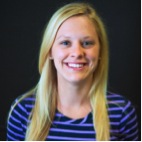 |
| Kristin Totoraitis |
Third-year medical student Kristin Totoraitis volunteered for OUCARES, the outreach services division of the Oakland University Center for Autism, when she was an undergraduate. She fell in love with the program, and now hopes to make a difference in the lives of those with autism in the health care system.
Her Capstone research project focuses on whether health care professionals need increased education in their interaction with individuals with the autism spectrum disorder (ASD). She presented the results of her research during the OUCARES-sponsored “Does Your Physician Speak Autism?” evening enrichment event. Totoraitis conducted the research with her Capstone mentor Mary Dereski, associate professor in OUWB’s Department of Biomedical Sciences.
During the event, Dereski facilitated and presented along with Totoraitis and hosted a panel also featuring physicians, a behavioral specialist and a parent. In an open discussion, the panel touched on subjects that included:
Issues related to young adults with autism
Research results showing physician awareness of the needs of young adults with high functioning autism
Areas of need in clinical settings identified by these individuals and their caregivers
How to best address the findings for the benefit of patients
Totoraitis said her studies have shown that there’s a need for increased education of individuals in the health care field and that there are specific needs of young adults with ASD when they go to their physician’s office.
Through her research, she conducted surveys with young adults with ASD, their caregivers and physicians, and found that 91 percent of parents surveyed still regularly help their young adult children or ward with their health care needs.
She also learned that when young adults and their caregivers visit their doctor, only 61 percent of them feel there is an understanding that the individual with ASD has specific health care needs.
“Parents are experts on their children, so if they’re saying there needs to be increased education, there should be,” said Totoraitis. “They’re seeing the deficits more than anyone.”

